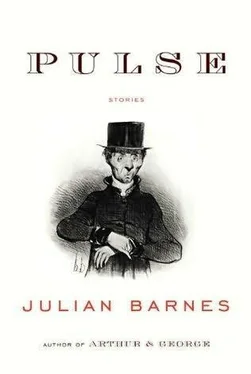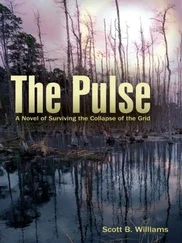Mrs Ridgewell asked if they’d had a quarrel. No, he said, they never quarrelled.
‘She was a nice girl,’ said the manageress. ‘Very reliable.’
‘Like a Polish builder.’
‘I hope you didn’t say that to her. It’s not a nice remark. And I don’t think she was Polish.’
‘No, she wasn’t.’ He looked out to sea. ‘ Oorals ,’ he found himself saying.
‘Pardon?’
You went to the station and showed a photograph of the missing woman to the booking clerk, who remembered her face and told you where she’d bought a ticket to. That’s what they did in films. But the nearest station was twelve miles away, and it didn’t have a ticket office, just a machine you put money or plastic into. And he didn’t even have a picture of her. They’d never done that thing couples do, crowding into a booth together, the girl sitting on the man’s lap, both half silly and out of focus. They were probably too old for that anyway.
At home he googled Andrea Morgen and got 497,000 results. Then he refined the question and cut the results down to 393. Did he want to search for ‘Andrea Morgan’? No, he didn’t want to search for someone else. Most of the stuff was in German, and he scrolled through it helplessly. He’d never done languages at school, never needed them since. Then he had a thought. He looked up an online dictionary and found the German for swimmer. It was a different word if you were a man or a woman. He typed in ‘Andrea Morgen’, ‘1967’, ‘Halle’, and ‘Schwimmerin’.
Eight results, all in German. Two seemed to be from newspapers, one from an official report. And there was a picture of her. The same one he’d found in the drawer: there she was, second from the left, arms around her teammates, big wrinkles in her white swimming cap. He paused, then hit ‘Translate this page’. Later, he found links to other pages, this time in English.
How could he have known, he asked himself. He could barely understand the science and wasn’t interested in the politics. But he could understand, and was interested in, things he wished afterwards he’d never read about, things which, even as he looked out at the sea from a window table in The Right Plaice, were already beginning to change his memory of her.
Halle was in what used to be East Germany. There had been a state recruiting scheme. Girls were picked out when they were as young as eleven. Vernon tried to put together the probable life of that chubby little blonde girl. Her parents signing a consent form and a secrecy form. Andrea enrolled in the Child and Youth Sports School, then in the Dynamo Sports Club in East Berlin. She had school lessons, but was mostly trained to swim and swim. It was a great honour to be a member of the Dynamo: that was why she’d had to leave home. Blood was taken from her earlobe to test how fit she was. There were pink pills and blue pills – vitamins, she was told. Later, there were injections – just more vitamins. Except that they were anabolic steroids and testosterone. It was forbidden to refuse. The training motto was ‘You eat the pills or you die’. The coaches made sure she swallowed them.
She didn’t die. Other things happened instead. Muscles grew but tendons didn’t, so tendons snapped. There were sudden bursts of acne, a deepening of the voice, an increase of hair on the face and body; sometimes the pubic hair grew up over the stomach, even above the navel. There was retarded growth and problems with fertility. Vernon had to look up terms like ‘virilisation’ and ‘clitoral hypertrophy’, then wished he hadn’t. He didn’t need to look up heart disease, liver disease, deformed children, blind children.
They doped the girls because it worked. East German swimmers won medals everywhere, the women especially. Not that Andrea had got to that level. When the Berlin Wall came down and the scandal broke, when they put the poisoners – trainers, doctors, bureaucrats – on trial, her name wasn’t even mentioned. In spite of the pills, she hadn’t made the national team. The others, the ones who went public about what had been done to their bodies and minds, at least had gold medals and a few years of fame to show for it. Andrea had come out with nothing more than a relay medal at some forgotten championship in a country that no longer existed.
Vernon looked out at the concrete strip and the shingle beach, at the grey sea and the grey sky beyond. The view was pretending it had always been the same, for as long as people had sat at this café window. Except that there used to be a row of beach huts blocking the view. Then someone had burnt them down.
At Phil & Joanna’s 1: 60/40
IT WAS THE week Hillary Clinton finally conceded. The table was a clutter of bottles and glasses; and though hunger had been satisfied, some mild social addiction kept making hands reach out to snaffle another grape, crumble a landslip from the cliff-face of cheese, or pick a chocolate from the box. We had talked about Obama’s chances against McCain, and whether in recent weeks Hillary had demonstrated guts or mere self-deception. We had also considered whether the Labour Party was any longer distinguishable from the Conservatives, the suitability of London’s streets for bendy buses, the likelihood of an al-Qaida attack on the 2012 Olympics, and the effect of global warming on English viticulture. Joanna, who had been quiet during these last two topics, now said with a sigh,
‘You know, I could really do with a cigarette.’
Everyone seemed to exhale slightly.
‘It’s just on occasions like this, isn’t it?’
‘The food. That lamb, by the way…’
‘Thanks. It’s six hours. Best way to do it. And star anise.’
‘And the wine…’
‘Not forgetting the company.’
‘When I was giving up, it was the disapproval I hated more than anything. You’d ask if anyone minded, and they all said no, but you could sense them turning away and not breathing in. And either pitying you, which was patronising, or even kind of loathing you.’
‘And there would never be an ashtray in the house and they’d do a long, exaggerated hunt for some old saucer which had lost its cup.’
‘And the next stage was going outside and freezing to death.’
‘And if you stubbed it out in some plant pot they’d look at you as if you’d given a geranium cancer.’
‘I used to take my butts home in my purse. In a plastic bag.’
‘Like dog crap. When did that start, by the way? About the same time? People walking around with inverted plastic bags on their hands, waiting for their dogs to crap.’
‘I always think it must be warm, mustn’t it? Feeling warm dog crap through the plastic.’
‘Dick, really .’
‘Well, I’ve never seen them waiting for it to cool down, have you?’
‘These chocolates, to change the subject. Why do the drawings never match what’s in the box?’
‘Or is it the other way round?’
‘The other way round’s the same way round. They still don’t match.’
‘The pictures are only an approximation. Like a communist menu. What would exist in an ideal world. Think of them as a metaphor.’
‘The chocolates?’
‘No, the drawings.’
‘I used to love a cigar. It didn’t have to be a whole one. Half would do.’
‘They gave you different cancers, didn’t they?’
‘What did?’
‘Cigarettes, pipes, cigars. Didn’t pipes give you lip cancer?’
‘What did cigars give you?’
‘Oh, the poshest kind.’
‘What’s a posh cancer? Isn’t that a contradiction in terms?’
‘Bum cancer’s got to be the bottom of the pile.’
‘Dick, really .’
‘Did I say something?’
‘Cancer of the heart – is that possible?’
Читать дальше











